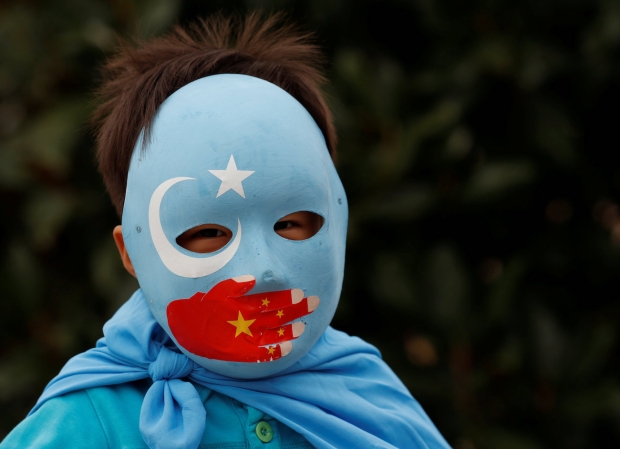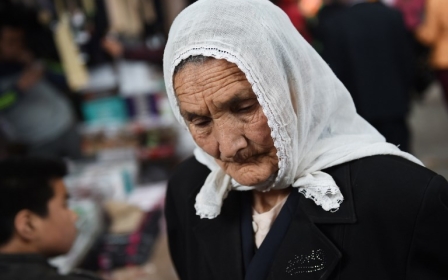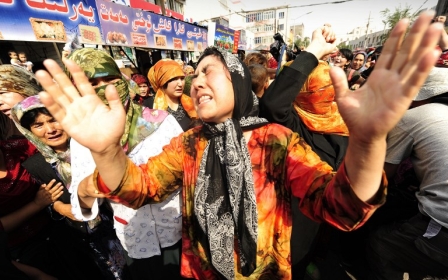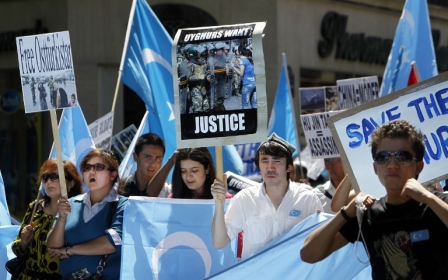'If we remain silent, it might get worse': Uighurs fear for loved ones in China
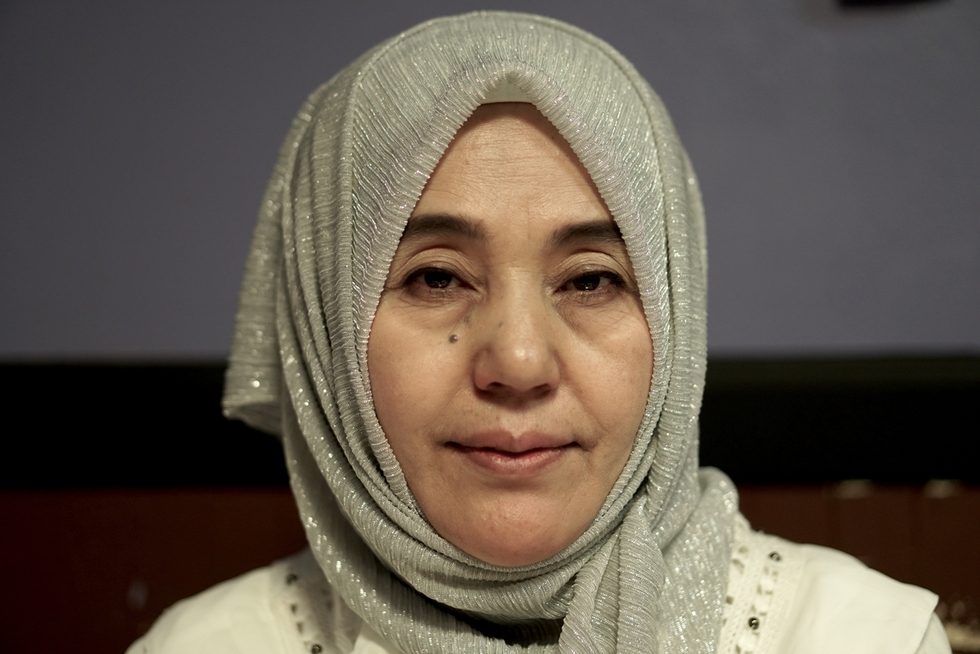
BOSTON, United States - Maria Mohammad, a 49-year-old Uighur mother of three, has not seen her husband in more than three years.
She fled her hometown of Atush in China’s northwest Xinjiang province in 2015 after the government began a brutal crackdown on the province’s Uighur population, a community of ethnically Chinese Muslims.
Mohammad's husband, Sadir Ali, a 47-year-old businessman, had to be left behind because the Chinese authorities confiscated his passport, she said. Though she has been separated from Ali ever since, she said she found some solace knowing her husband was still safe.
But earlier this year, that changed.
“My husband has been missing since June,” she told MEE at a small restaurant in downtown Boston, Massachusetts. “I do not know what has happened to him.”
Mohammad left for Boston to join her two children in 2015 after it became apparent that a crackdown on Uighurs was imminent.
She now said she fears Ali may be one of more than one million Uighur Muslims held in internment camps in Xinjiang, an area that many Uighurs call occupied East Turkistan.
According to multiple reports, the Chinese government has built mass internment camps across the region and unrolled massive surveillance infrastructure as a means to monitor and control the Uighur community of about 10 million people.
Entire families have disappeared into the camps, or have been executed, Ugihurs say.
Muhammad's daughter, 26-year-old Aadila who also lives in Boston, told MEE that all of her father’s siblings except one are being held in “reeducation camps”, a term used to describe the internment camps.
She said more than 35 of her family members have disappeared into the camps.
Uighur Muslims have long battled China’s secularisation policy, but the situation dramatically changed when politician Chen Quanguo became Xinjiang’s party secretary in 2016. Prior to moving to Xinjiang, Quanguo was in charge of Tibet, where he is said to have pursued similar policies in a bid to silence and force the assimilation of Tibetans.
In Xinjiang, Muslims have been routinely rounded up for showing overt signs of their Islamic faith, be it praying, wearing Islamic clothing or insisting on halal food, human rights groups have documented. They have also been subjected to physical violence, torture and even killed.
Uighurs in the United States
While estimates vary, between 1,000 and 15,000 Uighurs currently reside in the US.
A majority of Uighurs in the country live in Washington, DC, which has been described as the political nerve centre of the East Turkistan movement.
“We want the US to understand we are an occupied people. The majority of our people believe that restoring our independence is the way forward,” said Salih Hudayar, the international and political officer of the East Turkistan National Awakening Movement, an Uighur advocacy group in the US.
On Wednesday, US lawmakers introduced bills in the House and Senate in an attempt to pressure US President Donald Trump to take action against the Chinese government for its treatment of the Uighurs.
Hudayar told MEE that the US legislators' push follows an advocacy campaign launched by the community that included “hundreds of letters to US senators”.
China responded to the proposed US legislation by saying US politicians “always choose to ignore their own domestic issues while over-enthusiastically interfering with other country's domestic affairs with irresponsible remarks, which are based on incorrect information and strong ideological bias”.
Still, about 100 Uighur activists and their supporters gathered outside the White House earlier this week to protest the deteriorating conditions in Xinjiang.
Activists say that most Uighur families in the US have relatives who have been arrested or killed by Chinese forces in their home province.
We want the US to understand we are an occupied people
- Salih Hudayar, East Turkistan National Awakening Movement
One Uighur in Washington, who spoke to MEE on the condition on anonymity, said about 60 family members had gone missing or could not be accounted for.
Abuduwaresi Abulimit, who has been living in Boston for the past two years, told MEE that as many as 86 people from his extended family had been taken.
“They have taken all the males … they have left just a few women at home,” he said.
He said both his parents and brother were currently in a camp.
“I feel a lot of pressure and I’m suffering from depression. People are just disappearing and it is hard to not get stressed by it,” he said.
China denies wrongdoing
China has repeatedly denied allegations that it is persecuting the minority group, calling concerns raised by Uighur community members, human rights groups and others “unjustified” and an “interference in China’s internal affairs”.
It has also denied allegations that it is implementing a political re-education programme, claiming that those in the camps are being trained to improve their job prospects.
In early November, Le Yucheng, China’s vice-minister of foreign affairs, told the United Nations in Geneva that the camps offered “vocational training” and described them as “free of charge”. He also claimed that the Chinese government's actions were taken as part of an effort to tackle religious extremism and terrorism.
Uighurs living abroad say the reach of the Chinese state extends far beyond their homeland.
The community, which also has a sizeable population in Turkey, says Chinese officials consistently reach out to them on social media, demanding personal information and often making blanket threats against their families.
I know I can't go back. I sometimes have nightmares that I return and they come for me
- Dogan Adeel, Uighur student in Boston
Dogan Adeel, a 23-year-old Uighur student in Boston, told MEE that he has not spoken to any member of his family for the past nine months because he fears his social media accounts are monitored.
“We just watch each other on social media and try to let each other know we are OK by posting about our lives, but we don’t talk directly to each other. It is too risky,” said Adeel, whose name has been changed to protect his identity amid a fear of reprisals.
“I know I can’t go back. I sometimes have nightmares that I return and they come for me," he said.
“It wasn’t so bad before. But I do remember being arrested for reading (the) Quran when I was 10 years old.”
'If we remain silent, it might get worse'
Maria Mohammad, whose husband disappeared in June, said her family was taking a risk by speaking out about her concerns for him or other members of her family.
“But if we remain silent, it might get worse,” she said.
But it's an uphill battle, as several heads of state, including in the Muslim world, have remained silent on the plight of the Uighurs, while members of the community have also been deported from Egypt, the UAE and Malaysia.
Mohammad's daughter Aadila said Uighurs understand the international community’s difficulties when it comes to dealing with China.
But she called on countries not to make things worse.
“If they are not going to speak up for us, at the very least they shouldn’t make it worse and put us in harm’s way," she said. "That is all we're asking."
Middle East Eye propose une couverture et une analyse indépendantes et incomparables du Moyen-Orient, de l’Afrique du Nord et d’autres régions du monde. Pour en savoir plus sur la reprise de ce contenu et les frais qui s’appliquent, veuillez remplir ce formulaire [en anglais]. Pour en savoir plus sur MEE, cliquez ici [en anglais].


